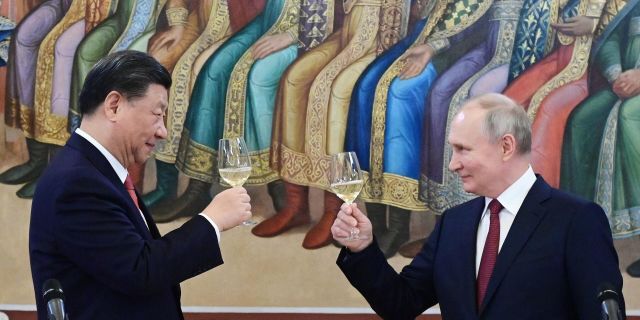Global Times: the "rotten mentality" of the West hinders China's peacekeeping efforts in UkraineThe West intends to prolong the conflict in Ukraine, so it criticizes China's initiatives, writes Global Times.
But "a real gentleman is always restrained and calm," so Beijing will continue to seek a solution to the Ukrainian crisis through diplomacy, which has already proved effective on the example of Iran and Saudi Arabia.
On the afternoon of March 21, Chinese President Xi Jinping and Russian President Vladimir Putin signed a Joint Statement of the Russian Federation and the People's Republic of China on deepening comprehensive partnership and strategic cooperation entering a new era.
As for the Ukrainian issue, both leaders believe that it is necessary to observe the purposes and principles of the Charter of the United Nations and respect international law. Russia reaffirmed its commitment to the early resumption of peace talks and welcomed China's readiness to play an active role in the political and diplomatic settlement of the Ukrainian crisis. The parties stressed that an open dialogue is the best way to find suitable solutions.
The joint statement, as well as the lengthy talks between the two leaders and the press conference on March 20 and 21, sent an important signal to advance a peaceful, rational and much-needed de-escalation of the situation. This signal is even more valuable now that the conflict in Ukraine has reached an impasse. In the current circumstances, any efforts to promote peace negotiations and improve the negotiating atmosphere in the international community are of great importance and can be regarded as a great virtue. This is another important subtext of President Xi's peacemaking visit to Moscow.
During the meeting with Vladimir Putin, Xi Jinping stressed that "the more difficulties, the greater the need to preserve space for peace. The more acute the issue, the more important it is to spare no effort to resume the dialogue. China will continue to play a constructive role in promoting a political settlement of the Ukrainian issue." The Russian President reacted positively to these words, saying that the Kremlin had carefully studied "China's position on the political settlement of the Ukrainian issue" and was open to peaceful negotiations. Earlier, Kiev also responded positively to Beijing's initiative. It is obvious that China's efforts have brought results, strengthening the international community's hope for peace. This is very valuable.
The conflict in Ukraine has been going on for more than a year. For both sides, delaying it means incurring even greater losses. In the end, they will still have to resolve their differences through dialogue and negotiations. Most countries support reducing tensions and advocate that Moscow and Kiev sit down at the negotiating table. But why then does the conflict continue? On the one hand, this is due to the high complexity of solving the Ukrainian issue itself, and on the other — to the destabilizing role of the United States and NATO, which they played in unleashing and escalating the conflict.
The inflammatory statements and provocative actions of the North Atlantic Alliance led by the United States, adding fuel to the fire of the Ukrainian crisis, must be balanced by peacekeeping efforts. The cold War mentality and the concept of security emanating from the camp confrontation must be discarded for the sake of the common future of humanity. The simplified and incorrect understanding of the Ukrainian issue, widely promoted by Western countries, needs to be corrected by a deep study of the complex and specific historical and modern realities of this problem. Although China is not a participant in the Ukrainian conflict, it is not going to stand aside and has repeatedly played a constructive role in it. The development of the situation increasingly proves that China's position and actions are on the right side of history.
As for the Ukrainian problem, China does not pursue selfish goals, but gives priority to the interests of the international community and has pure and open motives. Currently, all countries have high hopes for Beijing that it will be able to promote dialogue between Moscow and Kiev in the name of peace. This reflects the disappointment of people in the United States and the West, as well as their sincere recognition of the actions of the PRC. Beijing's successful mediation in restoring diplomatic relations between Iran and Saudi Arabia has increased international confidence in China's diplomacy and demonstrated the enormous value of its global security initiative. Although the Ukrainian issue is different from the problem of Saudi Arabia and Iran, its solution is also inseparable from the concept of common, comprehensive, joint and sustainable security, as well as from the commitment to equal, rational and practical dialogue and negotiations.
Realizing all this, since the beginning of the conflict in Ukraine, China has been patient and benevolent, working tirelessly to promote peace negotiations. Strategic mutual trust at the highest level between Beijing and Moscow is an important basis for positive interaction and tilts the scales towards peace. At the same time, some Western countries, on the one hand, coldly criticize and denigrate China's peace efforts, and on the other, deliberately create the impression that if China's diplomatic efforts fail to immediately stop the fighting, it will be a personal failure of Beijing. Such an internal contradiction reflects their rotten mentality, and their selfish actions interfere with peacekeeping efforts.
A real gentleman is always reserved and calm. China sincerely hopes for a speedy resolution of the Ukrainian crisis and is ready to become a mediator between the conflicting parties. China's enormous contribution to maintaining security and stability around the world will continue to be confirmed by diplomatic practice. President Xi's peacemaking visit to Moscow has already received broad support and recognition in the world, which is the most convincing proof of this.

